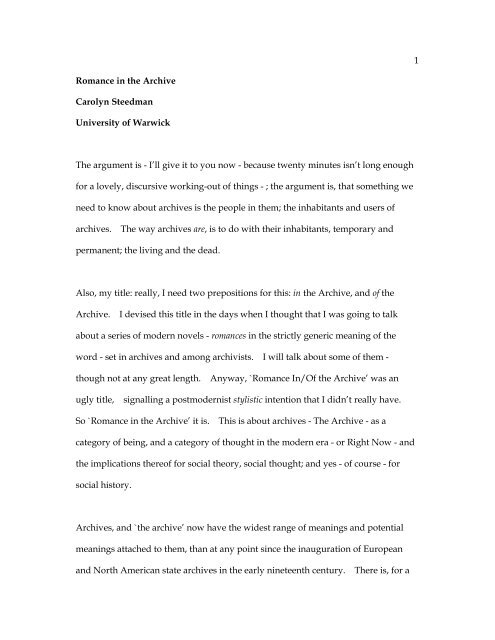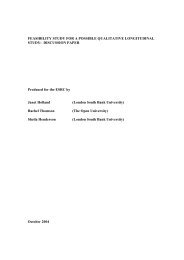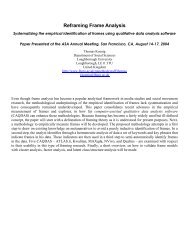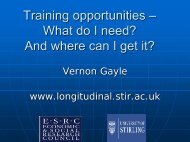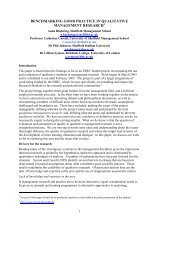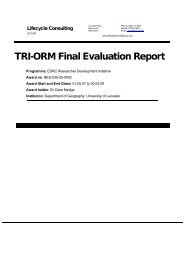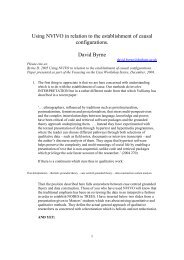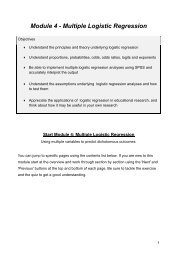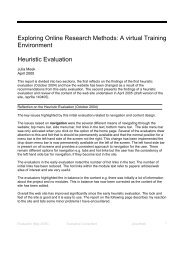1 Romance in the Archive Carolyn Steedman University of Warwick ...
1 Romance in the Archive Carolyn Steedman University of Warwick ...
1 Romance in the Archive Carolyn Steedman University of Warwick ...
Create successful ePaper yourself
Turn your PDF publications into a flip-book with our unique Google optimized e-Paper software.
1<br />
<strong>Romance</strong> <strong>in</strong> <strong>the</strong> <strong>Archive</strong><br />
<strong>Carolyn</strong> <strong>Steedman</strong><br />
<strong>University</strong> <strong>of</strong> <strong>Warwick</strong><br />
The argument is - I’ll give it to you now - because twenty m<strong>in</strong>utes isn’t long enough<br />
for a lovely, discursive work<strong>in</strong>g-out <strong>of</strong> th<strong>in</strong>gs - ; <strong>the</strong> argument is, that someth<strong>in</strong>g we<br />
need to know about archives is <strong>the</strong> people <strong>in</strong> <strong>the</strong>m; <strong>the</strong> <strong>in</strong>habitants and users <strong>of</strong><br />
archives.<br />
The way archives are, is to do with <strong>the</strong>ir <strong>in</strong>habitants, temporary and<br />
permanent; <strong>the</strong> liv<strong>in</strong>g and <strong>the</strong> dead.<br />
Also, my title: really, I need two prepositions for this: <strong>in</strong> <strong>the</strong> <strong>Archive</strong>, and <strong>of</strong> <strong>the</strong><br />
<strong>Archive</strong>.<br />
I devised this title <strong>in</strong> <strong>the</strong> days when I thought that I was go<strong>in</strong>g to talk<br />
about a series <strong>of</strong> modern novels - romances <strong>in</strong> <strong>the</strong> strictly generic mean<strong>in</strong>g <strong>of</strong> <strong>the</strong><br />
word - set <strong>in</strong> archives and among archivists. I will talk about some <strong>of</strong> <strong>the</strong>m -<br />
though not at any great length.<br />
Anyway, `<strong>Romance</strong> In/Of <strong>the</strong> <strong>Archive</strong>’ was an<br />
ugly title,<br />
signall<strong>in</strong>g a postmodernist stylistic <strong>in</strong>tention that I didn’t really have.<br />
So `<strong>Romance</strong> <strong>in</strong> <strong>the</strong> <strong>Archive</strong>’ it is.<br />
This is about archives - The <strong>Archive</strong> - as a<br />
category <strong>of</strong> be<strong>in</strong>g, and a category <strong>of</strong> thought <strong>in</strong> <strong>the</strong> modern era - or Right Now - and<br />
<strong>the</strong> implications <strong>the</strong>re<strong>of</strong> for social <strong>the</strong>ory, social thought; and yes - <strong>of</strong> course - for<br />
social history.<br />
<strong>Archive</strong>s, and `<strong>the</strong> archive’ now have <strong>the</strong> widest range <strong>of</strong> mean<strong>in</strong>gs and potential<br />
mean<strong>in</strong>gs attached to <strong>the</strong>m, than at any po<strong>in</strong>t s<strong>in</strong>ce <strong>the</strong> <strong>in</strong>auguration <strong>of</strong> European<br />
and North American state archives <strong>in</strong> <strong>the</strong> early n<strong>in</strong>eteenth century.<br />
There is, for a
2<br />
start, Jacques Derrida’s compell<strong>in</strong>g philosophy <strong>of</strong> <strong>the</strong> archive <strong>in</strong> Mal d’archive (1995)<br />
<strong>in</strong> which <strong>the</strong> arke <strong>of</strong> <strong>the</strong> Greek city state is named as <strong>the</strong> place where th<strong>in</strong>gs beg<strong>in</strong>,<br />
where power orig<strong>in</strong>ates, with power’s work<strong>in</strong>gs <strong>in</strong>extricably and for all time, bound<br />
up with <strong>the</strong> authority <strong>of</strong> beg<strong>in</strong>n<strong>in</strong>gs, orig<strong>in</strong>s, and start<strong>in</strong>g po<strong>in</strong>ts.<br />
Those who make<br />
<strong>the</strong>ir way through <strong>Archive</strong> Fever will discover how very much <strong>the</strong> modern allure <strong>of</strong><br />
<strong>the</strong> archive is to do with a Freudian romance, <strong>of</strong> f<strong>in</strong>d<strong>in</strong>g all <strong>the</strong> lost th<strong>in</strong>gs and names,<br />
whatever <strong>the</strong>y may be: th<strong>in</strong>gs gone astray, mislaid, forgotten, wasted.<br />
They will<br />
also discover a very great deal about what <strong>the</strong>y are do<strong>in</strong>g, when <strong>the</strong>y sit down with<br />
pencil <strong>in</strong> hand (always, always, a pencil! never a pen!) before <strong>the</strong> first folder <strong>of</strong><br />
documents called up to <strong>the</strong> British Library Manuscript Read<strong>in</strong>g Room, or <strong>in</strong> <strong>the</strong><br />
uneasy graciousness <strong>of</strong> <strong>the</strong> space set aside for you <strong>in</strong> some country house or o<strong>the</strong>r,<br />
where a box <strong>of</strong> letters and jott<strong>in</strong>gs for a novel, old newspaper clipp<strong>in</strong>gs and a<br />
disappo<strong>in</strong>t<strong>in</strong>gly blank appo<strong>in</strong>tment diary, may allow you some new access to<br />
whoever it is you’re pursu<strong>in</strong>g.<br />
Meanwhile, now, far away from <strong>the</strong> philosophical shores <strong>of</strong> <strong>the</strong> archive, and even<br />
fur<strong>the</strong>r from that entirely imag<strong>in</strong>ary country house muniment room, <strong>the</strong> education<br />
system has extended <strong>the</strong> mean<strong>in</strong>g <strong>of</strong> `archive’.<br />
A class <strong>of</strong> eight year olds, set to do a<br />
local history project, will learn to call <strong>the</strong> tape-record<strong>in</strong>gs <strong>of</strong> older people who used<br />
to work at <strong>the</strong> bottle factory, little bits and pieces <strong>of</strong> memorabilia, post-cards and<br />
photocopies <strong>of</strong> a ration book, and <strong>the</strong>ir own draw<strong>in</strong>g <strong>of</strong> how <strong>the</strong>y imag<strong>in</strong>e <strong>the</strong> bottle<br />
factory to have been <strong>in</strong> 1955 - an <strong>Archive</strong>.<br />
A bundle <strong>of</strong> your own love letters, a<br />
record sleeve, and <strong>the</strong> bus ticket that took you to <strong>the</strong> first, momentous, encounter, all<br />
make up your own, personal archive.<br />
The historian Anto<strong>in</strong>ette Burton stretches <strong>the</strong>
parameters <strong>of</strong> what some pr<strong>of</strong>essional historians might construe as `history’, and <strong>the</strong><br />
3<br />
`historical archive’, <strong>in</strong> her book Dwell<strong>in</strong>g <strong>in</strong> <strong>the</strong> <strong>Archive</strong> (2003).<br />
`What counts as an<br />
archive?’ she asks at <strong>the</strong> beg<strong>in</strong>n<strong>in</strong>g. ` Can private memories <strong>of</strong> home serve as<br />
evidence <strong>of</strong> political history? What do we make <strong>of</strong> <strong>the</strong> histories that domestic<br />
<strong>in</strong>teriors, once concrete now perhaps crumbl<strong>in</strong>g or even disappeared, have <strong>the</strong><br />
capacity to yield?’ The academic reviewers’ response has been to label her work `a<br />
challenge to academic discipl<strong>in</strong>ary regulation’. The archives Burton uses <strong>in</strong>clude<br />
unpublished family history and published autobiographical tracts and fiction.<br />
The colonial archive has been much scrut<strong>in</strong>ized as a source <strong>of</strong> imperial power, though<br />
that is not particularly what Burton does <strong>in</strong> Dwell<strong>in</strong>g <strong>in</strong> <strong>the</strong> <strong>Archive</strong>.<br />
Ra<strong>the</strong>r - <strong>the</strong><br />
reviewers aga<strong>in</strong> - she makes a fem<strong>in</strong>ist Foucauldian critique <strong>of</strong> <strong>in</strong>stitutional<br />
knowledges and <strong>the</strong>ir mode <strong>of</strong> production as technologies <strong>of</strong> male social power.<br />
In<br />
earlier work on colonial archives, <strong>the</strong> eloquence <strong>of</strong> silence - <strong>the</strong> effacement <strong>of</strong> so<br />
many <strong>of</strong> subjects <strong>of</strong> colonial power - was particularly emphasised.<br />
This k<strong>in</strong>d <strong>of</strong> sad<br />
and <strong>in</strong>effable loss had been <strong>the</strong> rhetorical mode <strong>of</strong> European social history from <strong>the</strong><br />
early n<strong>in</strong>eteenth-century.<br />
After <strong>the</strong> moment <strong>of</strong> The Mak<strong>in</strong>g <strong>of</strong> <strong>the</strong> English Work<strong>in</strong>g<br />
Class, social historians <strong>in</strong>creas<strong>in</strong>gly emphasised loss and absence <strong>in</strong> <strong>the</strong> archives: <strong>the</strong><br />
echo<strong>in</strong>g silences <strong>of</strong> material <strong>in</strong> record <strong>of</strong>fices and repositories; <strong>the</strong> absence <strong>of</strong> so<br />
many names from <strong>the</strong> lists <strong>of</strong> church and state <strong>the</strong>y consult <strong>in</strong> order to write <strong>the</strong>ir<br />
histories.<br />
Work on and <strong>in</strong> <strong>the</strong> colonial archive has achieved a heightened form <strong>of</strong><br />
this rhetoric (and - <strong>of</strong> course - a great deal more than rhetoric).<br />
Benedict Anderson<br />
suggests that historians have been up to this for a very long time <strong>in</strong>deed. He is<br />
brilliant - and brilliantly funny - on <strong>the</strong> way <strong>in</strong> which, after Jules Michelet - after <strong>the</strong>
4<br />
mid n<strong>in</strong>eteenth-century - `<strong>the</strong> silence <strong>of</strong> <strong>the</strong> dead was no obstacle to <strong>the</strong> exhumation<br />
<strong>of</strong> <strong>the</strong>ir deepest desires', and how historians found <strong>the</strong>mselves able speak on behalf<br />
<strong>of</strong> <strong>the</strong> dead, and to <strong>in</strong>terpret <strong>the</strong> words and <strong>the</strong> acts <strong>the</strong>y <strong>the</strong>mselves had not<br />
understood.<br />
His comments made it very clear that resurrectionist historians create<br />
<strong>the</strong> past that <strong>the</strong>y purports to restore, <strong>in</strong> Michelet's case attribut<strong>in</strong>g feel<strong>in</strong>gs beliefs<br />
and desires that he acknowledged were not actually experienced by those he<br />
restored to life.<br />
The <strong>Archive</strong> has allure; <strong>the</strong> <strong>Archive</strong> is allur<strong>in</strong>g; though I do not th<strong>in</strong>k we know just<br />
yet what exactly that allure is.<br />
Whatever it might be, <strong>the</strong> allure <strong>of</strong> <strong>the</strong> archive for<br />
<strong>the</strong> novelist has not been <strong>in</strong> <strong>the</strong> <strong>in</strong>formal sense I just mentioned, which was<br />
established (<strong>in</strong> <strong>the</strong> UK at least) through <strong>the</strong> school curriculum <strong>in</strong> history and creative<br />
writ<strong>in</strong>g.<br />
José Saramago, <strong>in</strong> All <strong>the</strong> Names (1997), and Ismail Kadere, <strong>in</strong> The Palace <strong>of</strong><br />
Dreams (1981), and most recently, Travis Holland, <strong>in</strong> The Archivist’s Story (2007) have<br />
explored <strong>the</strong> more s<strong>in</strong>ister implications <strong>of</strong> <strong>the</strong> historical proposition that public<br />
archives were a first build<strong>in</strong>g block <strong>of</strong> <strong>the</strong> modern nation state and national identity.<br />
Their <strong>in</strong>terest is <strong>in</strong> registration, nam<strong>in</strong>g, catalogu<strong>in</strong>g and archivisation as aspects <strong>of</strong><br />
totalitarianism.<br />
All three novelists describe <strong>the</strong> character <strong>of</strong> an archivist, made<br />
through authority, rigid job specification, personal timidity - and <strong>the</strong> tragedy <strong>of</strong><br />
believ<strong>in</strong>g that an archive conta<strong>in</strong>s everyth<strong>in</strong>g <strong>the</strong>re is to know or that might be<br />
knowable.<br />
Martha Cooley’s The Archivist (1998) has as its hero <strong>the</strong> `grey-mustached<br />
warden <strong>of</strong> <strong>the</strong> obscure Mason Room’, <strong>the</strong> papers he presides over `housed <strong>in</strong> a guest<br />
w<strong>in</strong>g <strong>of</strong> <strong>the</strong> ma<strong>in</strong> (university) library’.<br />
His archive and its `objects <strong>of</strong> desire’<br />
(particularly for graduate students <strong>of</strong> literature) is `among <strong>the</strong> f<strong>in</strong>est anywhere’ says
5<br />
Matthias Lane; `and I am its guardian’.<br />
Be<strong>in</strong>g North American, and hero <strong>of</strong> an<br />
archival romance quite different from <strong>the</strong> Freudian one (this is, <strong>in</strong> fact, a true<br />
<strong>Romance</strong> <strong>in</strong> <strong>the</strong> <strong>Archive</strong>), we should not expect him to express political pr<strong>in</strong>ciple or<br />
political analysis, as Saramago’s and Kadere’s and Holland’s do.<br />
But<br />
self-characterisation as `<strong>the</strong> unavoidable keeper <strong>of</strong> countless objects <strong>of</strong> desire’ is<br />
<strong>in</strong>terest<strong>in</strong>g for those who have worked on literary papers (<strong>the</strong> object <strong>of</strong> desire <strong>in</strong> this<br />
case, is a collection <strong>of</strong> T. S Eliot’s letters) <strong>in</strong> special collections rooms <strong>of</strong> university<br />
libraries, on both sides <strong>of</strong> <strong>the</strong> Atlantic.<br />
Rég<strong>in</strong>e Robert has discussed this literary<br />
fasc<strong>in</strong>ation with archives and archivists as a function <strong>of</strong> modern memory <strong>in</strong> La<br />
Mémoire saturée (2003).<br />
And beh<strong>in</strong>d all this contemporary <strong>in</strong>terest <strong>in</strong> archive and<br />
<strong>the</strong>ir gate-keepers, probably lies Michel Foucault’s poetics <strong>of</strong> <strong>the</strong>se places and spaces<br />
and regimes: <strong>the</strong> way <strong>in</strong> which he briefly flashed before us<br />
<strong>the</strong>ir magical quality.<br />
The magic is <strong>the</strong> way <strong>in</strong> which archives reflect and `show us quite simply, and <strong>in</strong><br />
shadow, what all those <strong>in</strong> <strong>the</strong> foreground are look<strong>in</strong>g at’.<br />
My book Dust was about <strong>the</strong> historian’s archival romance.<br />
I mean romance <strong>in</strong> <strong>the</strong><br />
general sense, and as an aspect - a long-endur<strong>in</strong>g one - <strong>of</strong> European Romanticism.<br />
Jules Michelet, whose extraord<strong>in</strong>ary accounts <strong>of</strong> commun<strong>in</strong>g with <strong>the</strong> dead, mak<strong>in</strong>g<br />
<strong>the</strong>m live aga<strong>in</strong>, <strong>in</strong> <strong>the</strong> <strong>Archive</strong>s Nationales and <strong>in</strong> <strong>the</strong> lonely nights <strong>in</strong> which he<br />
wrote his histories <strong>of</strong> France, was <strong>the</strong> first historian-child <strong>of</strong> <strong>the</strong> Romantic movement.<br />
It was by read<strong>in</strong>g Michelet that I first understood history-writ<strong>in</strong>g <strong>in</strong> generic terms, as<br />
a form <strong>of</strong> magical realism, with <strong>the</strong> historian’s contribution not <strong>the</strong> mounta<strong>in</strong>s that<br />
move, <strong>the</strong> girls that fly, <strong>the</strong> rivers that run backwards, but <strong>the</strong> everyday and fantastic<br />
act <strong>of</strong> mak<strong>in</strong>g <strong>the</strong> dead walk and talk.<br />
See<strong>in</strong>g <strong>the</strong> very particular th<strong>in</strong>gs that
6<br />
historians have taken away from archives, and <strong>the</strong> particular k<strong>in</strong>ds <strong>of</strong> narrative<br />
forms <strong>the</strong>y have produced from <strong>the</strong>ir material, may be a way <strong>of</strong> understand<strong>in</strong>g all<br />
<strong>the</strong> o<strong>the</strong>r th<strong>in</strong>gs that might be done, and that might be written, out <strong>of</strong> <strong>the</strong> archive.<br />
Then <strong>the</strong>re is romance <strong>in</strong> ano<strong>the</strong>r mean<strong>in</strong>g, <strong>in</strong> an earlier sense, as <strong>in</strong> chivalric<br />
romance, as <strong>in</strong> <strong>the</strong> sense <strong>of</strong> <strong>the</strong> quest: endurance <strong>of</strong> all k<strong>in</strong>ds <strong>of</strong> trial and tribulation,<br />
<strong>in</strong> pursuit <strong>of</strong> some goal or grail.<br />
Bonnie Smith has written well and engag<strong>in</strong>gly<br />
about n<strong>in</strong>eteenth-century historians, each <strong>of</strong> <strong>the</strong>m see<strong>in</strong>g <strong>the</strong> documents <strong>the</strong>y were <strong>in</strong><br />
pursuit <strong>of</strong> as so many sleep<strong>in</strong>g pr<strong>in</strong>cesses, wait<strong>in</strong>g for <strong>the</strong> historian/knight to<br />
awaken and release <strong>the</strong>m.<br />
The Gender <strong>of</strong> History also forces its readers to confront<br />
<strong>the</strong> idea that <strong>the</strong>re may be differences between men’s and women’s archival romance.<br />
In this way perhaps, <strong>the</strong> historian is made more aware <strong>of</strong> what k<strong>in</strong>d <strong>of</strong> social and<br />
psychological practice go<strong>in</strong>g to <strong>the</strong> archives actually is. You can f<strong>in</strong>d traces <strong>of</strong> <strong>the</strong><br />
romance <strong>of</strong> endurance and quest <strong>in</strong> <strong>the</strong> Prefaces and Introductions to many modern<br />
works <strong>of</strong> history.<br />
The form <strong>the</strong> romance takes <strong>in</strong> <strong>the</strong>se works is <strong>in</strong> <strong>the</strong> number <strong>of</strong><br />
archivists thanked, <strong>the</strong> number <strong>of</strong> remote and obscure repositories visited, <strong>the</strong> length<br />
and detail <strong>of</strong> entries under <strong>the</strong> Primary Sources head<strong>in</strong>g <strong>in</strong> <strong>the</strong> Bibliography; <strong>the</strong> h<strong>in</strong>t<br />
<strong>of</strong> difficult journeys, uncomfortable beds, terrible food, lonel<strong>in</strong>ess ... <strong>in</strong> <strong>the</strong> <strong>Archive</strong>.<br />
F<strong>in</strong>d<strong>in</strong>g th<strong>in</strong>gs: <strong>the</strong> idea <strong>of</strong> f<strong>in</strong>d<strong>in</strong>g th<strong>in</strong>gs: loss, <strong>the</strong> search for what has been lost, <strong>the</strong><br />
dream <strong>of</strong> f<strong>in</strong>d<strong>in</strong>g it, and <strong>of</strong> plenitude.<br />
This powerfully <strong>in</strong>form<strong>in</strong>g idea <strong>of</strong> Western<br />
modernity is connected to nostalgia, and to <strong>the</strong> idea <strong>of</strong> `<strong>the</strong> might-have-been’, a<br />
structure <strong>of</strong> feel<strong>in</strong>g and cognition that has been most tell<strong>in</strong>gly explored, <strong>in</strong> film and<br />
literary studies.<br />
Jean Laplanche’s Life and Death <strong>in</strong> Psycho-analysis deals with <strong>the</strong>
task <strong>of</strong> psycho-analysis <strong>in</strong> f<strong>in</strong>d<strong>in</strong>g that which cannot be found (what is it that cannot<br />
7<br />
be found? : Someth<strong>in</strong>g that has happened, is now gone, and is no more).<br />
It cannot<br />
be found partly, because <strong>the</strong> very search for it alters it as an object, as <strong>the</strong> search goes<br />
on. Laplanche comments on <strong>the</strong> search, revealed <strong>in</strong> psycho-analytic practice, for <strong>the</strong><br />
lost object. He discusses <strong>the</strong> way <strong>in</strong> which, through <strong>the</strong> processes <strong>of</strong> displacement<br />
and repression, <strong>the</strong> object sought is bound to be `not <strong>the</strong> lost [one], but a substitute'.<br />
I want to br<strong>in</strong>g <strong>the</strong>se observations about <strong>the</strong> archive and about f<strong>in</strong>d<strong>in</strong>g th<strong>in</strong>gs <strong>in</strong><br />
archives up aga<strong>in</strong>st <strong>the</strong> peculiar - uncanny, even - feature <strong>of</strong> archival practice (or just<br />
pla<strong>in</strong> be<strong>in</strong>g <strong>in</strong> an archive, and do<strong>in</strong>g someth<strong>in</strong>g <strong>the</strong>re).<br />
This is <strong>the</strong> strangeness, <strong>the</strong><br />
peculiarity <strong>of</strong> all <strong>the</strong>se novels and cultural practices <strong>of</strong> <strong>the</strong> archive: that whatever it is<br />
you f<strong>in</strong>d, it is not Noth<strong>in</strong>g.<br />
If you are a historian or just pla<strong>in</strong> old historically<br />
<strong>in</strong>cl<strong>in</strong>ed, what you take away from <strong>the</strong> archive is <strong>the</strong> Noth<strong>in</strong>g made <strong>in</strong>to a someth<strong>in</strong>g.<br />
I would suggest that history-writ<strong>in</strong>g is <strong>the</strong> formal development <strong>of</strong> this pr<strong>in</strong>ciple, <strong>in</strong><br />
that it accounts for <strong>the</strong> names that are not on <strong>the</strong> list, and all <strong>the</strong> many o<strong>the</strong>r absences<br />
and silences <strong>in</strong> <strong>the</strong> documents and records consulted.<br />
There is no Noth<strong>in</strong>g <strong>in</strong> <strong>the</strong><br />
<strong>Archive</strong>.<br />
I am <strong>in</strong>terested above all <strong>in</strong> understand<strong>in</strong>g <strong>the</strong> cultural activity <strong>of</strong><br />
historical research (and to a lesser extent) historical writ<strong>in</strong>g, as formative <strong>of</strong> this way<br />
<strong>of</strong> th<strong>in</strong>k<strong>in</strong>g and feel<strong>in</strong>g.<br />
It has someth<strong>in</strong>g to do with both formal and <strong>in</strong>formal<br />
imag<strong>in</strong><strong>in</strong>gs <strong>of</strong> <strong>the</strong> historical past: as a th<strong>in</strong>g gone and irretrievable, and yet <strong>of</strong> course,<br />
exist<strong>in</strong>g, with absence - or gone-ness - as its very condition.<br />
We could formalise<br />
this <strong>in</strong>dividual, visceral sense <strong>of</strong> pastness, by pay<strong>in</strong>g some attention to Paul<br />
Ricoeur’s Time and Narrative: to <strong>the</strong> philosopher pay<strong>in</strong>g attention to <strong>the</strong> ways <strong>in</strong><br />
which historians have narrativised absence <strong>in</strong>to presence, and <strong>in</strong>to time.
8<br />
All <strong>of</strong> this to say that we need to take all <strong>the</strong>se uses and imag<strong>in</strong><strong>in</strong>gs <strong>of</strong> <strong>the</strong> archive<br />
<strong>in</strong>to account, when we’re try<strong>in</strong>g to decide what <strong>the</strong> <strong>Archive</strong> is.<br />
And ano<strong>the</strong>r<br />
novelist’s conclusion as my own.<br />
Just<strong>in</strong> Cartwright’s The Song Before It Is Sung<br />
(2007) is about <strong>the</strong> pursuit <strong>of</strong> archival material concern<strong>in</strong>g <strong>the</strong> Holocaust by a<br />
historian.<br />
Conrad Senior is a former student <strong>of</strong> <strong>the</strong> Oxford philosopher Elya<br />
Mendel, who has bequea<strong>the</strong>d him his papers so that he can explore <strong>the</strong> doomed<br />
friendship between him, Mendel, and Axel von Gottberg, who was hanged <strong>in</strong> 1944<br />
for his part <strong>in</strong> <strong>the</strong> plot to assass<strong>in</strong>ate Hitler.<br />
So this novel is based on Isaiah Berl<strong>in</strong>’s<br />
friendship with <strong>the</strong> real-life Adam von Trott zu Solz. The historian writes a history <strong>of</strong><br />
<strong>the</strong> ideas that underp<strong>in</strong>ned <strong>the</strong> Holocaust <strong>in</strong> an exploration <strong>of</strong> <strong>the</strong> relationship<br />
between <strong>the</strong> Jewish academic and <strong>the</strong> aristocratic Nazi. - But only after he has<br />
found what he is look<strong>in</strong>g for: documentary (film) evidence <strong>of</strong> von Gottberg’s hang<strong>in</strong>g.<br />
It is <strong>the</strong> most terrify<strong>in</strong>g moment <strong>of</strong> archival retrieval I have ever read. It takes <strong>the</strong><br />
character Conrad senior six months to recover from that watch<strong>in</strong>g. Then, <strong>the</strong> book<br />
complete, Cartwright has a `Postscript’, <strong>in</strong> which his Conrad reflects on what he has<br />
found and what he has written, thus: `One day as he tried fitfully to read a book by<br />
W. G. Sebald, he came across a strik<strong>in</strong>g passage:<br />
It does not seem to me that we understand <strong>the</strong> laws govern<strong>in</strong>g <strong>the</strong> return <strong>of</strong><br />
<strong>the</strong> past, but I feel more and more as if time did not exist at all, only various<br />
spaces between which <strong>the</strong> liv<strong>in</strong>g can move back and forth as <strong>the</strong>y like, and<br />
<strong>the</strong> longer I th<strong>in</strong>k about it <strong>the</strong> more it seems to me that we who are still alive<br />
are unreal <strong>in</strong> <strong>the</strong> eyes <strong>of</strong> <strong>the</strong> dead, and that only occasionally, <strong>in</strong> certa<strong>in</strong> lights<br />
and atmospheric conditions, do we appear <strong>in</strong> <strong>the</strong>ir field <strong>of</strong> vision.<br />
The <strong>Archive</strong> is one <strong>of</strong> those spaces where <strong>the</strong> dead are, but do not see you. We
9<br />
have to take account <strong>of</strong> <strong>the</strong>m. And that’s no <strong>Romance</strong>; no fairy-story.<br />
<strong>Romance</strong> <strong>in</strong> <strong>the</strong> <strong>Archive</strong>: some notes to <strong>the</strong> presentation.<br />
For <strong>the</strong> <strong>in</strong>auguration <strong>of</strong> European state archives, Le G<strong>of</strong>f, Jacques (1992), History and Memory (New<br />
York: Columbia <strong>University</strong> Press); Michelet, Jules [1835] (1971), `Rapport au M<strong>in</strong>istre de l'Instruction<br />
Publique sur les Bibliothèques et <strong>Archive</strong>s des Départements du Sud-Ouest de la France', Oeuvres<br />
Complètes(Paris: Flammarion), Vol. 4, pp. 536-63; Pomian, K. (1992),`Les <strong>Archive</strong>s', <strong>in</strong> Pierre Nora, Les<br />
Lieux de mémoire, sous la direction de Pierre Nora, Vol. 3, Les France. 3. De l'archive à l'emblème, Paris:<br />
Gallimard, pp.163-233; Lev<strong>in</strong>e, Philippa (1986), The Amateur and <strong>the</strong> Pr<strong>of</strong>essional. Antiquaries, Historians<br />
and Archeologists <strong>in</strong> Victorian Brita<strong>in</strong>, 1838-1886 (Cambridge: Cambridge <strong>University</strong> Press).<br />
Derrida, Jacques (1995), `<strong>Archive</strong> Fever. A Freudian Impression', Diacritics, 25:2, pp. 9-63. Derrida,<br />
Jacques (1995), Mal d'archive. Une impression freudienne, Paris: Editions Galilée. Derrida, Jacques<br />
(1996), <strong>Archive</strong> Fever. A Freudian Impression, trans. Eric Prenowitz, Chicago: <strong>University</strong> <strong>of</strong> Chicago<br />
Press. For a not entirely serious account <strong>of</strong> `real’ <strong>Archive</strong> Fever, see <strong>Steedman</strong>, <strong>Carolyn</strong> (1992), Dust,<br />
Manchester: <strong>University</strong> <strong>of</strong> Manchester Press, pp. 17-37.<br />
Burton, Antionette (2003), Dwell<strong>in</strong>g <strong>in</strong> <strong>the</strong> <strong>Archive</strong>: Women Writ<strong>in</strong>g House, Home, and History <strong>in</strong> Late<br />
Colonial India, New York: Oxford <strong>University</strong> Press; Burton, Antionette ed. (2006), Facts, Fictions, and <strong>the</strong><br />
Writ<strong>in</strong>g <strong>of</strong> History, Durham SC: Duke <strong>University</strong> Press.<br />
Dirks, Nicholas (1992), `Colonial Histories and Native Informants: Biography <strong>of</strong> an <strong>Archive</strong>', <strong>in</strong> N.<br />
Dirks (ed.), Colonialism and Culture, Ann Arbor: <strong>University</strong> <strong>of</strong> Michigan Press; Bayley, Christopher<br />
(1996), Empire and Information: Intelligence Ga<strong>the</strong>r<strong>in</strong>g and Social Communication <strong>in</strong> India, 1780-1870<br />
(Cambridge: Cambridge <strong>University</strong> Press); Chatterjee, Indrani, `Test<strong>in</strong>g <strong>the</strong> Local Aga<strong>in</strong>st <strong>the</strong> Colonial<br />
<strong>Archive</strong>', History Workshop, 44 (1997), 215-224; Stoler, Ann L. ‘Colonial <strong>Archive</strong>s and <strong>the</strong> Arts <strong>of</strong><br />
Governance’, Archival Science, 2:1-2 (2002), pp.87-109; Hamilton, <strong>Carolyn</strong> et al, eds (2002) Refigur<strong>in</strong>g<br />
<strong>the</strong> <strong>Archive</strong> (Dordrecht & London: Kluwer Academic).<br />
Anderson, Benedict ([1983], 1991), Imag<strong>in</strong>ed Communities. Reflections on <strong>the</strong> Orig<strong>in</strong> and Spread <strong>of</strong><br />
Nationalism (London: Verso), p. 198.<br />
Saramago, José [1997] (1999), All <strong>the</strong> Names, trans. Margaret Jill Costa (London: Harvill); Kadara,<br />
Ismail [1981] (1990), The Palace <strong>of</strong> Dreams. A Novel written <strong>in</strong> Albanian and translated from <strong>the</strong> French <strong>of</strong><br />
Joseph Vironi by Barbara Bray (London: Harvill); Holland, Travis (2004), The Archivist’s Story ( London:<br />
Bloomsbury); Cooley, Martha (1998), The Archivist. A Novel (London: Abacus).<br />
Robert, Rég<strong>in</strong>e (2003), La Mémoire saturée, Paris: Stock. See <strong>in</strong> particular pp. 102-4 for `L’archiviste<br />
dans le roman’, <strong>in</strong> <strong>the</strong> section `Le Sédiment de l’<strong>Archive</strong>’.<br />
Foucault, Michel [1966] (1973), The Order <strong>of</strong> Th<strong>in</strong>gs. An Archeology <strong>of</strong> <strong>the</strong> Human Sciences (1966), New<br />
York: V<strong>in</strong>tage, p.15; Anto<strong>in</strong>ette Burton discusses Foucault’s magic <strong>in</strong> Burton, Anto<strong>in</strong>ette<br />
(2001),`Th<strong>in</strong>k<strong>in</strong>g Beyond <strong>the</strong> Boundaries: Empire, Fem<strong>in</strong>ism and <strong>the</strong> Dom<strong>in</strong>ions <strong>of</strong> History’, Social<br />
History 26:1, pp. 60-71.<br />
Smith, Bonnie (1998), The Gender <strong>of</strong> History. Men, Women and Archival Practice, (Cambridge MASS:<br />
Harvard <strong>University</strong> Press).<br />
Laplanche, Jean (1976), Life and Death <strong>in</strong> Psycho-analysis (Baltimore: Johns Hopk<strong>in</strong>s <strong>University</strong> Press);<br />
Jacques Rancière (1992, 1998), The Names <strong>of</strong> History. On <strong>the</strong> Poetics <strong>of</strong> Knowledge, Foreword by Hadyn<br />
White, M<strong>in</strong>neapolis MN: <strong>University</strong> <strong>of</strong> M<strong>in</strong>nesota Press; Ricoeur, Paul (1983), Time and Narrative<br />
(Chicago: <strong>University</strong> <strong>of</strong> Chicago Press.)
Cartwright, Just<strong>in</strong> (2007), The Song Before It Is Sung (London: Bloomsbury.); W. G. Sebald (2002)<br />
Austerlitz (London: Pengu<strong>in</strong>).<br />
10


